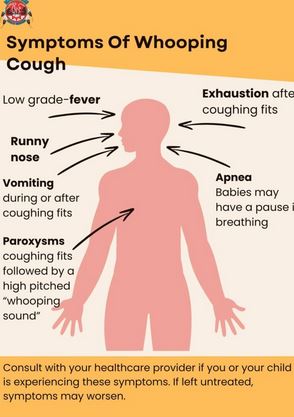An infant has died from whooping cough, the Mississippi State Department of Health confirmed, marking the state’s first pertussis-related death in more than a decade.
Officials said the baby was under two months old and too young to receive the pertussis vaccine.

Dr. Dan Edney, Mississippi’s State Health Officer, noted the last whooping cough deaths occurred in 2008 and 2012.
He believes the recent surge is due to declining vaccination rates, noting that while childhood vaccination remains high, adult coverage lags behind.
This gap, he warned, increases the risk for infants who are not yet eligible for the vaccine.
Whooping cough is a highly contagious respiratory illness that causes severe coughing fits and shortness of breath.
It spreads through droplets that are released into the air when an infected person sneezes or coughs.
It often starts with cold-like symptoms such as congestion and a runny nose, but eventually develops into a harsh cough that makes a distinctive “whooping” sound, hence the name.
If left untreated, pertussis can persist for two to eight weeks.

Still, iinfected individuals are advised to quarantine to prevent spreading it, particularly to infants or people with weakened immune systems, as it can lead to dangerous breathing problems.
Babies, however, may not develop a cough at all. Instead, they can show other symptoms such as trouble breathing, bluish skin, lips, or nails, and in some cases, apnea – dangerous pauses in breathing.
Fortunately, antibiotics can treat pertussis and also help reduce the risk of transmitting it to others.
The most effective way to prevent whooping cough is through the Tdap vaccine, which also provides protection against diphtheria and tetanus.
This vaccine is available for anyone over the age of seven.
Because infants are too young to be vaccinated, it is especially important for adults and older children to be immunized in order to protect them.

Families with newborns should keep them at home and limit visitors- particularly anyone who is sick – during their first few weeks of life.
Once infants reach two months old, they can begin the DTaP vaccine series, which protects children under seven against whooping cough.
While highly effective, the pertussis vaccine is not 100 percent protective, meaning the best safeguard for infants is to maintain strong community-wide immunity.








